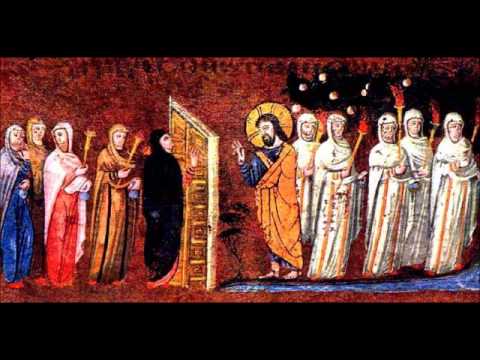
On the first three days of Holy Week, the prayer “Behold, the bridegroom comes in midnight” is heard in Orthodox churches. The main message that its text contains is the need for spiritual vigilance, which now, on Passionate, is maximal throughout Lent.
'Lord, give me a mortal memory!' - says another prayer. A person does not know when his earthly path will end, therefore, one must always be internally ready to meet with Eternity. After all, the human soul will be weighed and evaluated exactly in the state in which it will appear before its Creator. Despondency, disbelief, insensibility to the spiritual world will not be good for the soul in the eyes of the Bridegroom, by which Christ the Lord is allegorically understood. This is what the prayer says. But why exactly the Bridegroom? This image refers us to the Gospel parable of ten virgins, five prudent and five - not so prudent, who, according to custom, went out to meet the groom at night. Some have stocked up with enough oil for their lamps, and the second - not: they asked for this combustible material from the first, thus risking leaving everyone without light at the moment of meeting ... Direct parallels can be traced between the text of the prayer and another New Testament parable - about the faithful servant (sometimes it is called differently: about the owner of the house). In it, the Savior says: blessed are those slaves whom the master, upon returning, will find awake - the same one who, thinking that the moment of return is not soon, will overeat, drink, beat the servants, the master will cut and subject to the same fate with the infidels. (Luke 12: 36-46). Here is the exact Church Slavic text of the prayer: “Behold, the Bridegroom is coming in midnight, and blessed is the slave who will find him vigilantly: he is unworthy of a pack, he will find him despondently. Be careful, my soul, do not be burdened by sleep, but you will not be betrayed to death, and shut up the Kingdom outside, but rise up calling: Holy, Holy, Holy God, have mercy on the Mother of God . '
'Lord, give me a mortal memory!' - says another prayer. A person does not know when his earthly path will end, therefore, one must always be internally ready to meet with Eternity. After all, the human soul will be weighed and evaluated exactly in the state in which it will appear before its Creator. Despondency, disbelief, insensibility to the spiritual world will not be good for the soul in the eyes of the Bridegroom, by which Christ the Lord is allegorically understood. This is what the prayer says. But why exactly the Bridegroom? This image refers us to the Gospel parable of ten virgins, five prudent and five - not so prudent, who, according to custom, went out to meet the groom at night. Some have stocked up with enough oil for their lamps, and the second - not: they asked for this combustible material from the first, thus risking leaving everyone without light at the moment of meeting ... Direct parallels can be traced between the text of the prayer and another New Testament parable - about the faithful servant (sometimes it is called differently: about the owner of the house). In it, the Savior says: blessed are those slaves whom the master, upon returning, will find awake - the same one who, thinking that the moment of return is not soon, will overeat, drink, beat the servants, the master will cut and subject to the same fate with the infidels. (Luke 12: 36-46). Here is the exact Church Slavic text of the prayer: “Behold, the Bridegroom is coming in midnight, and blessed is the slave who will find him vigilantly: he is unworthy of a pack, he will find him despondently. Be careful, my soul, do not be burdened by sleep, but you will not be betrayed to death, and shut up the Kingdom outside, but rise up calling: Holy, Holy, Holy God, have mercy on the Mother of God . '
Share:





